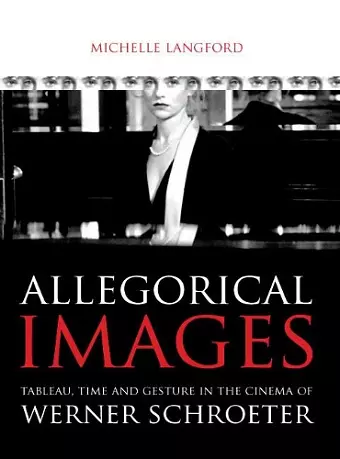Allegorical images
Tableau, Time and Gesture in the Cinema of Werner Schroeter
Format:Paperback
Publisher:Intellect
Published:15th Sep '06
Currently unavailable, our supplier has not provided us a restock date

Werner Schroeter is one of the most important and influential directors of the New German Cinema, yet discussion of his films within film theory has been intermittent and un-sustained. This book provides a long-overdue introduction to Schroeter’s visually lavish, idiosyncratic and conceptually rich cinema, situating its emergence within the context of the West German television and film subsidy system during the 1970s, then moving on to engage with some of the most pertinent and important arguments in contemporary film theory. Drawing upon the work of Gilles Deleuze, Walter Benjamin, and Bertolt Brecht, the author negotiates her way through the complex allegorical terrain of Schroeter’s films by focusing on their insistent and original use of the cinematic tableaux, allegorical montage, temporal layering and gestural expression. In doing so, this book also makes a valuable contribution to developing a theory of cinematic allegory by locating Schroeter’s films in the context of a wider 'allegorical turn' in contemporary European and post-colonial filmmaking. 'Allegorical Images' serves not only as a compelling and sophisticated introduction to Schroeter’s cinema, but also makes a major contribution to a range of debates in contemporary film theory around allegory, tableaux, time and gesture.
"By excavating the ruined margins of New German Cinema together with the remnants of a marginalised film theory project, Langford herself becomes an allegorist, shattering our settled ideas about both, and yet conserving elements of each for reconsideration in light of the current Deleuzian moment in cinema studies. Langford is an original thinker whose keen scholarly insights restore not only Schroeter's lost films but a lost moment in film culture." - Felicity Collins, La Trobe University, Australia "Langford fulfils her task by drawing on Benjamin's theory of allegory, Deleuze's concept of the time-image and Brechtian ideas about gesture and tableau. Her project revises a now neglected body of theoretical, critical and politicised writing which, in the 1970s-80s, championed an intellectual cinema of political modernism (exemplified by Godard and Kluge, among others), in opposition to the voyeuristic pleasures of classical narrative or entertainment cinema. The book brings this lost modernist paradigm into a new context, making a significant contribution to the still-emerging field of Deleuzian film thinking. The ambitious achievement of Langford's book is its revitalisation of interest in a particular kind of film aesthetic and the conceptual work that might illuminate it - Langford's approach to cinema in general is made clear in an exemplary chapter in which she develops a provisional theory of cinematic allegory. Paying close attention to common ground between Benjamin's allegorical thinking and Deleuze's theory of postwar European cinema, Langford identifies the allegorical-image as a specific kind of time-imageA" (p. 55). Here, she skilfully weaves together a number of tropes (notably, the fragment and the child) which characterise not only Benjamin and Deleuze's thinking but also Adorno's desire for an alternative to the standardised films of the culture industry." - Felicity Collins, La Trobe University, Australia "If you are acquainted with or even passionate about Schroeter's work, this detailed deconstruction of the technical and theoretical elements of his craft will prove invaluable." - James Benefield, Transition Tradition
ISBN: 9781841501383
Dimensions: unknown
Weight: unknown
215 pages